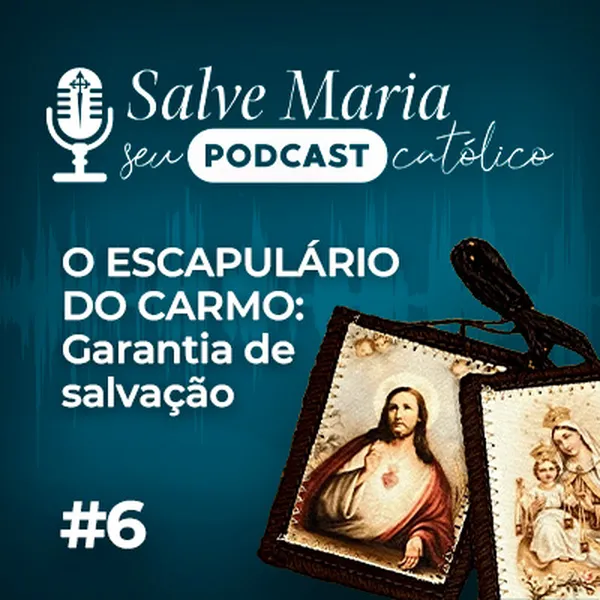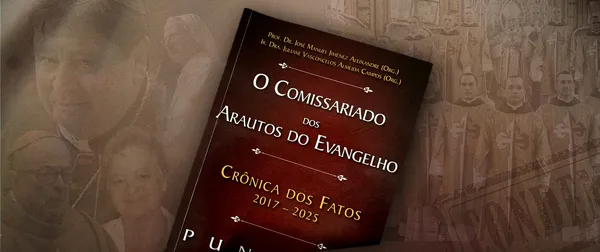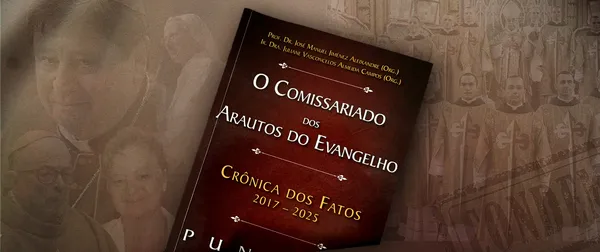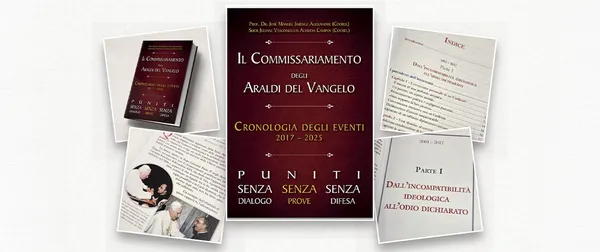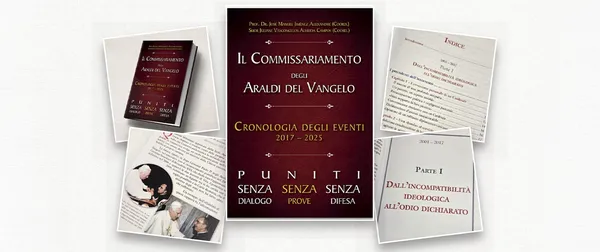The reason for the book: prolonged silence, inevitable doubts
More than a week has passed since the work “The Commissariate of the Heralds of the Gospel” was made known to the general public, and the number of people, whether favorable or not to the Institution, who have been inquiring about the reason for a work of such scope and content has increased considerably.
To respond to these requests for clarification, and for the sake of truth, the Heralds of the Gospel believe that the time has come to bring to light, in greater detail, what motivated the recent publication.
In fact, in the press release[1] published by the Institution, some essential explanations have already been given in summary form. The statement emphasized the excessive and inexplicable prolongation of the intervention, which raises questions about the suitability of the commissioned institution and, consequently, requires clarification to restore truth and justice.
The statement also recalled the great damage caused by the situation, both to the Heralds of the Gospel and to the Holy Church: numerous deacons who were unable to see fulfilled their legitimate expectation, supported by Canon Law, of being ordained priests, in addition to seven classes of seminarians who were unable to enter the diaconate, many other members prevented from taking their vows, aspirants whose admission is vetoed, and young people who found themselves deprived of an educational project free from influences contrary to the teachings of the Gospel.
The genesis of the work: a chronicle of injustices
These reasons – to which must be added “various violations of canon law,” as the Note asserts – motivated the book's drafting committee, composed of experts and headed by Prof. Dr. José Manuel Jiménez Aleixandre, Doctor of Canon Law, and Sr. Dr. Juliane Vasconcelos Almeida Campos, Doctor of Philosophy.
The work consists of three parts, the first and main one being a chronicle of the facts, which aims to narrate dispassionately the injustices to which the Heralds of the Gospel have been subjected since the beginning of the intervention in 2017.
There, the book recalls the lack of transparency of the then Congregation for Institutes of Consecrated Life and Societies of Apostolic Life, later the Dicastery, which at no time revealed to the accused the content of the complaints or the subject matter of the alleged crimes that led to the decree of the Apostolic Visitation and, subsequently, the Commissariat, the curtailment of ordinations, the prohibition of the Heralds from hosting young people, and other punishments.
Furthermore, the chronicle narrates the repeated abuses of power, arbitrariness, and illegalities on the part of the Dicastery and its representatives, in addition to demonstrating the lack of suitability of some of those who made up the Commissariat's auxiliary team, and the great moral, economic, institutional, pastoral, and educational damage caused by the intervention, which, in principle, was intended to “heal” and “help.”
Documents that speak for themselves
The second part consists of an appendix, which provides a small selection of documents that have been duly archived over the years, through which the veracity of the information contained in the chronicle can be verified.
Finally, the work concludes with another appendix, of a legal-canonical nature, composed of libelli that assess, from a strictly technical perspective and in light of Church law, the irregularities that occurred in the process, such as alteration of the decree, various abuses of authority, or non-compliance with the Constitutions of the Virgo Flos Carmeli Society, among many others.
When the truth does not reach the Pope…
However, it should be noted that the above reasoning aims to justify the preparation of the book – as, in fact, the Note clearly states – but not specifically its publication.
Although these reasons were, per se, sufficient to justify the publication of the work, the latter was intended to remain in the historical archives of the Heralds of the Gospel, available for eventual defense, should we be asked for explanations. However, some recent events have forced us to act differently.
First, during the audience granted by His Holiness, Pope Leo XIV, to His Excellency, Bishop Sérgio Aparecido Colombo, which was attended by two members of the Clerical Society of Apostolic Life Virgo Flos Carmeli, we were disturbed to learn that the Dicastery for Institutes of Consecrated Life and Societies of Apostolic Life, in the person of its Prefect and collaborators, had conveyed false information to the Holy Father regarding the Heralds of the Gospel and their Founder, for example, stating that there were victims of abuse, or that not all legal proceedings had been concluded, or, finally, that the determinations regarding the accommodation and formation of minors in the Association's houses had not been complied with–in all cases, statements whose complete groundlessness the book has been able to demonstrate.
The hostility continues and the international media lynching
Subsequently, through authoritative Vatican sources, we have verified that the Dicastery, even after the aforementioned audience with Pope Leo XIV, continues to spread untruths and distorted facts about the Heralds of the Gospel – among others, that there are very serious proceedings pending against the Institution, which, we reiterate, does not correspond at all to reality.
As children and servants of the Holy Church, we were deeply shocked to learn that the truth has been lacking towards the Vicar of Christ, just as we had already been shocked by the lack of dialogue and transparency on the part of the authorities of such an illustrious body of the Roman Curia as the aforementioned Dicastery throughout the entire period of intervention.
In addition, this same Dicastery has repeatedly released information that has caused the media lynching of the Heralds of the Gospel in numerous countries, especially Brazil, Italy, Spain, and Colombia, primarily through the leaking of documents and information, which quickly reached the press while being withheld from the Heralds of the Gospel themselves.
Reports ignored, dialogue denied
Now, there is evidence that shows how this attitude of contempt by the Dicastery towards the Institution has not changed to this day. Here it is:
The aforementioned body of the Curia disregards all reports that are favorable to the Heralds of the Gospel.
There are two letters signed in 2024 by His Eminence, Cardinal João Braz de Aviz, then prefect of the Dicastery, and Sr. Simona Brambilla, MC, his secretary at the time, prohibiting the holding of the Assembly and General Chapters, and stating that they would appoint experts to follow up on the matter. However, no such appointment was made.
When the names of the experts of the current commission were disclosed, the aforementioned members of the Dicastery responded curtly, concluding with: “please do not pursue this matter.” Almost a year and a half later, no canonical or theological expert has been appointed.
In addition, for over a year now, the closure to dialogue and opacity of the aforementioned body has become even more pronounced, as the Heralds of the Gospel no longer receive any kind of response from it, regardless of the nature of the matter, not even for the final report of the Commission, provided more than six months ago by His Eminence, Cardinal Raymundo Damasceno Assis. On this last point, it is worth presenting some more information.
In fact, His Eminence, Cardinal Raymundo Damasceno's report, delivered in May of this year (2025), was thorough, totaling about sixty pages and with extensive documentation attached.
The document gives an account of all the points raised during the intervention, both in relation to the financial sector, with opinions from Monsignor Nereudo Freire Henrique – at the time Treasurer of the CNBB[2] – and in relation to legal matters, with opinions from Dr. Hugo José Sarubbi Cysneiros – legal advisor to the Commissariate, who also holds the same position with the CNBB and the Apostolic Nunciature of Brazil – or, finally, other matters concerning the Commissariat, such as the request for the ordination of deacons, among others.
The unthinkable attitude of those who should be dialoguing
Almost two months after the delivery, Sr. Simona Brambilla visited Brazil. In the capital of the federation, there was a Herald priest attending the conference she gave on July 8, but he was unable to make personal contact with her.
On the other hand, the prefect, together with Fr. Airton, received six kilograms of documents from Rosiley Maria Piva and Valéria Rocha da Fonseca de Oliveira, which, according to reliable sources, contained the same false accusations that had been presented during the Apostolic Visitation, already answered and clarified in canonical and/or civil courts.
The dossier was taken to the Nunciature, where both detractors had the opportunity to explain it in detail during an audience that lasted more than two hours.
In October, during a symposium of Church institutes related to the apparitions of the Blessed Virgin Mary in Fatima, held in the city where they occurred, and in which the Heralds of the Gospel participated, Sister Simona Brambilla was not present at the presentations given by members of the institution.
Furthermore, during the event, the Sr. Brambilla happened to see two Heralds on the street. When they approached her to greet her, she immediately crossed to the other side of the street, apparently to avoid the encounter.
Now, this was the procedure required by the so-called “Vitandus excommunication,” a modality that no longer exists in the current edition of the Code of Canon Law, in addition to being incompatible with the synodal path currently being preached.
A similar incident occurred when a member of the Association, who was accompanying Cardinal Raymundo Damasceno to a meeting with a canonist from the Dicastery, tried to greet the latter and was also avoided.
Also, in October – five months after Cardinal Raymundo Damasceno submitted his report – the cardinal had occasion to report to us that he had requested an audience with His Eminence, Cardinal Artime.
However, the latter's secretary informed him that the cardinal could only receive him if the subject was not the Heralds of the Gospel, in which case Sr. Simona would need to be present.
Evidence of growing bias
Not satisfied, the Commissioner went to the Dicastery, where he was received by the Prefect's secretary, who informed him on her behalf that they had not yet had time to read the entire report by D. Damasceno, due to the fact that it was “too much” for the few collaborators. We reiterate that this occurred five months after the report was delivered, and the document consisted of about sixty pages.
Now, the above data leads to the following conclusions:
Even today, there is a clear animosity on the part of the Dicastery in general, and the Prefect in particular, toward the Heralds of the Gospel, which naturally taints any action in the process with partiality.
From this, it can be inferred that the current stagnation of the Commissariate is merely a way of buying time until new pretexts arise to resume the intervention with vigor.
There is evidence of the intention of detractors to artificially provoke new complaints, which are duly sent to the authorities of the Dicastery without any verification of the information.
Therefore, rumors, whose authoritative sources have requested anonymity, that the Dicastery for Institutes of Consecrated Life and Societies of Apostolic Life intends to restart the entire process, in addition to continuing to spread untrue and distorted information, are thus confirmed.
Last resort: publication
The Heralds of the Gospel had the opportunity to clarify the main elements of the current situation to the Holy Father during a private audience with the Bishop of Bragança.
However, given the hierarchical structure of the Church – a feature that is in itself a source of veneration for all the faithful, but which can in some cases be manipulated in bad faith – the aforementioned Dicastery enjoys direct access to His Holiness and will certainly give a new version if called upon to do so.
Our institution, however, will certainly not have the same conditions to access not only the Holy Father, but also the countless people vulnerable to misinformation, whom this infamous campaign could harm.
Thus, without other means to defend ourselves before the Supreme Pontiff and the Catholic public, who are once again being misled, there was no other remedy but to take this extreme measure to defend our honor: namely, to make this book/dossier available to people of good will, as well as to bring the aforementioned information to the general public, until such time as we are summoned to be given the right to respond.

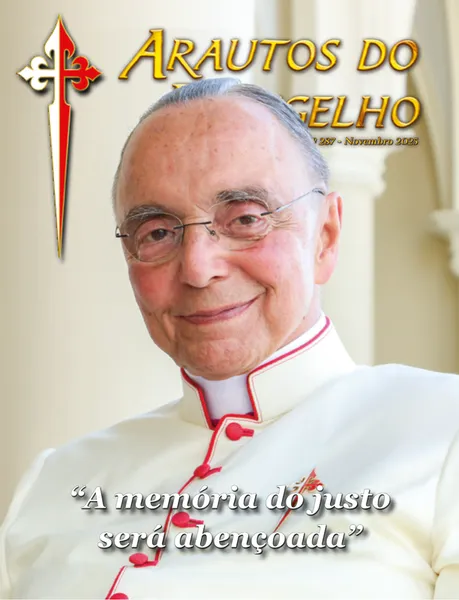 Revista Arautos do Evangelho, Ano XXIV, nº 287, Novembro 2025
Revista Arautos do Evangelho, Ano XXIV, nº 287, Novembro 2025
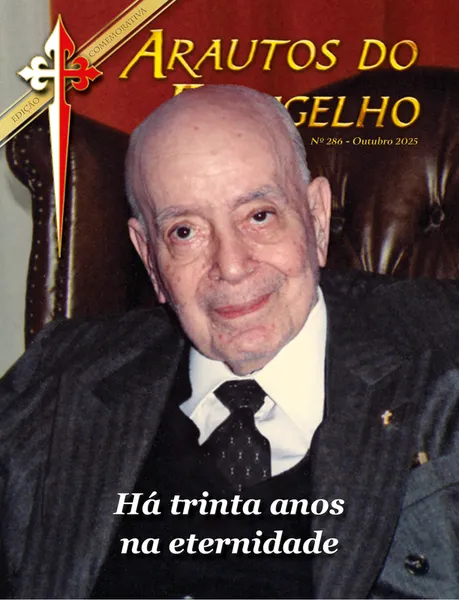 Revista Arautos do Evangelho, Ano XXIV, nº 286, Outubro 2025
Revista Arautos do Evangelho, Ano XXIV, nº 286, Outubro 2025
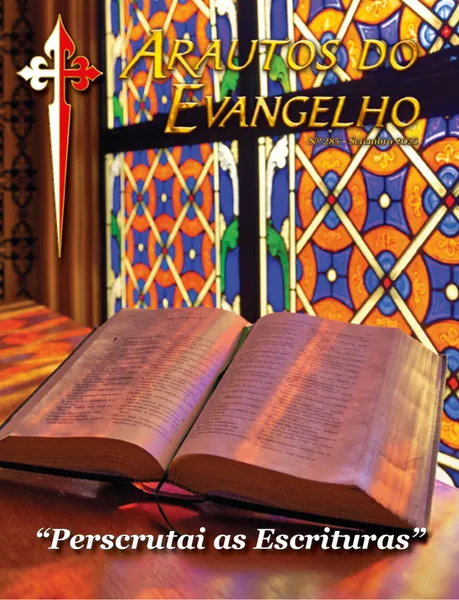 Revista Arautos do Evangelho, Ano XXIV, nº 285, Setembro 2025
Revista Arautos do Evangelho, Ano XXIV, nº 285, Setembro 2025
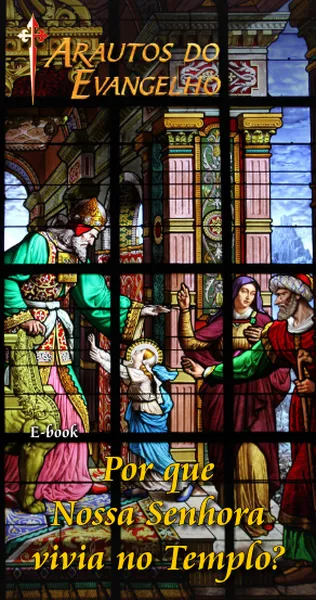 Nov/2025 - Por que Nossa Senhora vivia no Templo
Nov/2025 - Por que Nossa Senhora vivia no Templo
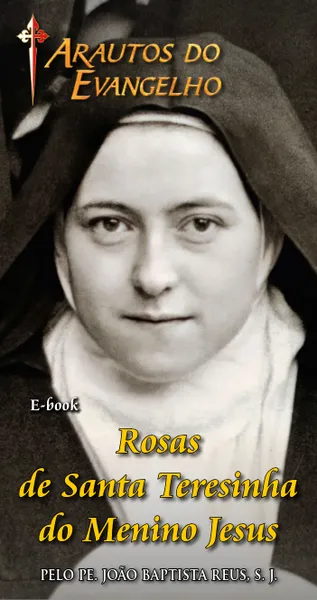 Set/2025 - Rosas de Santa Teresinha
Set/2025 - Rosas de Santa Teresinha
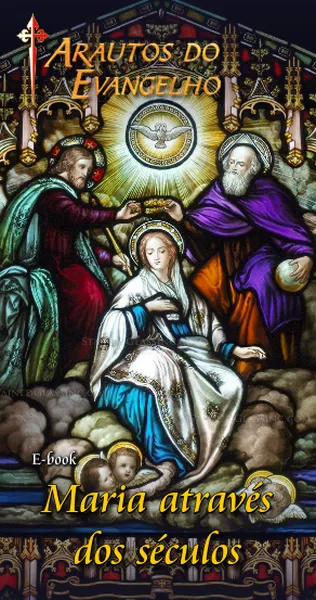 Ago/2025 - Maria através dos Séculos
Ago/2025 - Maria através dos Séculos





